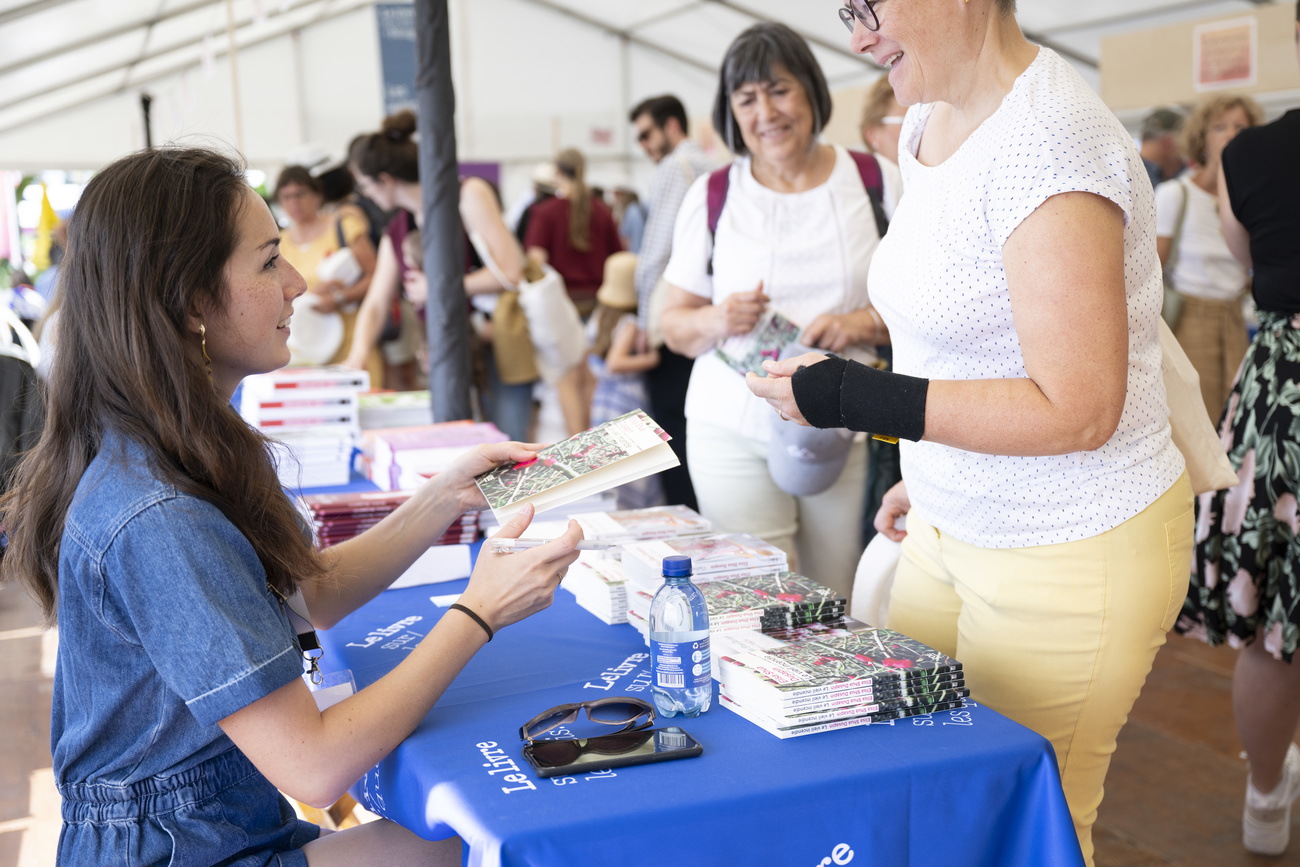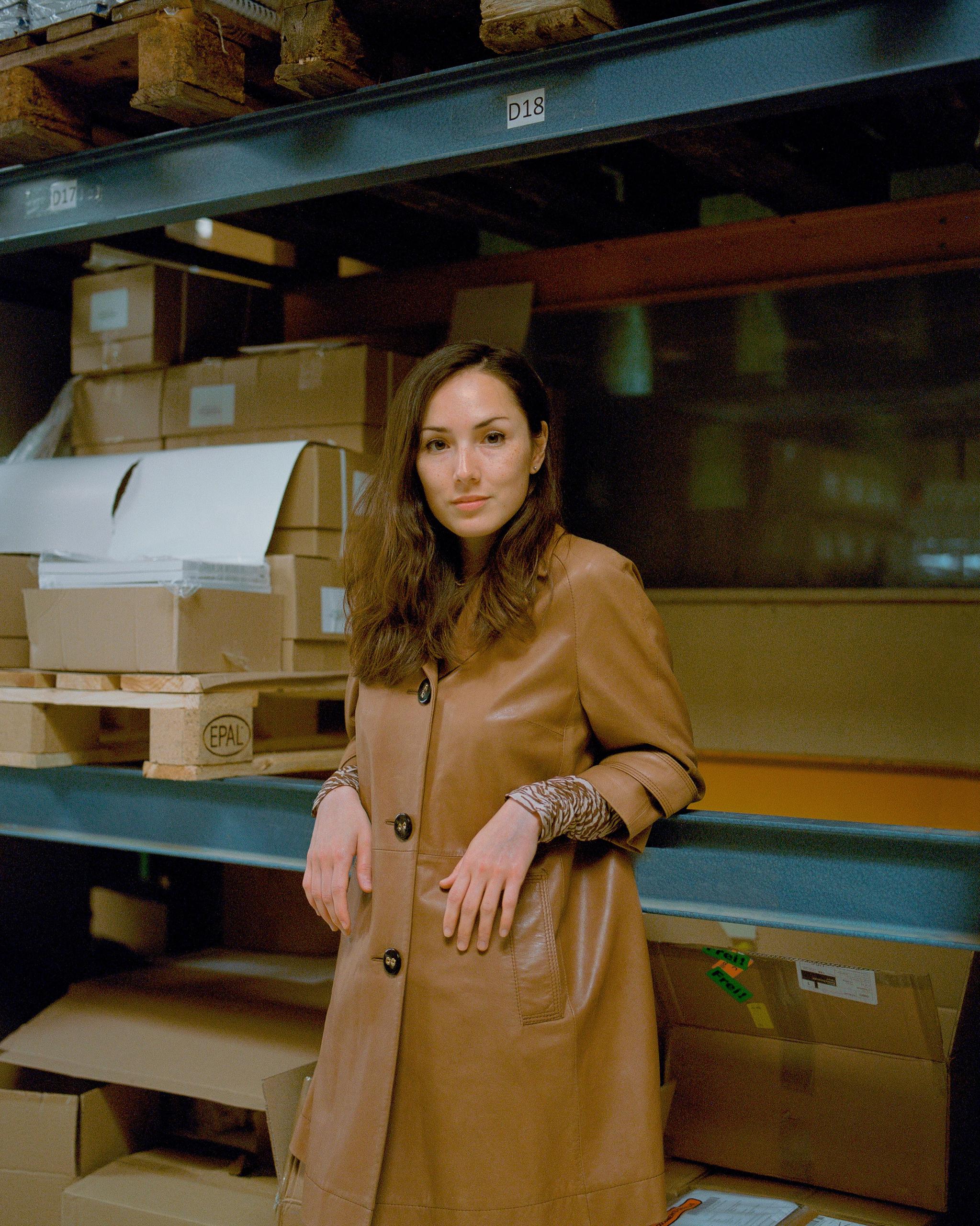
Author Elisa Shua Dusapin: ‘Swiss linguistic diversity resonates with me’

Swiss author Elisa Shua Dusapin is enjoying great success both in Switzerland and abroad. Her work has been translated into more than 30 languages and she has been awarded numerous prizes, including the prestigious National Book Award. Nevertheless, she is keeping her feet on the ground.
Dusapin, 31, is one of Switzerland’s best ambassadors. Her four novels (so far) are notable for their restraint and subtlety. Having been translated into so many languages, they have given the author a grand entry to the global cultural scene.
Academies, bookshops, libraries, fairs and international literary festivals often invite her. Her diary is full, yet she won’t let herself be swamped by fame. She maintains her reserve. Time is what she lacks, not modesty.
At 31, Dusapin’s astonishing achievements could have gone to her head, but this well-screwed-on head doesn’t want the glitter. “I’m not a star,” she says. And even less a young novelist in search of profitability, churning out stereotyped products that sell well.
Rich heritage
An enchanting singularity distinguishes Elisa Shua Dusapin’s novels. It originates in the inner worlds of her characters, who are connected to different cultures just as she is. Born to a French father and a Korean mother, Dusapin arrived in Porrentruy in canton Jura aged five with her parents. She has been exploring this rich heritage since her first novel, Winter in Sokcho.

This book, published by Zoé in 2016, received a warm reception from both the public and critics. Its success was confirmed with several prizes, such as the National Book Award for Translated Literature for its English translation in 2021.
Dusapin became the first Swiss novelist to receive this highly valued American award, established in 1950. Her fame spread and sales took off. Some 50,000 copies were sold, which is rare for a novel not about rape, incest, money or crime.
Difficulties of communication
Dusapin broadens our ideas and boundaries, using both gentleness and tension. Thus, her first novel is set on the other side of the world in Sokcho, a small town in South Korea. A young girl meets a French comic book artist who is on a visit to Korea.
There is mutual attraction, but there are also difficulties of communication, a common feature of her other novels. In The Pachinko Parlour, her characters are in Tokyo, whereas her third novel is set in Vladivostok, as the title Vladivostok Circus indicates. There is always a tension between an individual’s private world and the physical world of a country.
“I really feel Swiss in this country of Helvetia, which has four national languages. This linguistic diversity is echoed in me and my work. I’ve been speaking Korean since my childhood, but at the same time I’m steeped in the culture of the Jura region and inspired by so many other places in the world that I’ve discovered during my writing residencies and the promotional tours for my books. When I started writing at the age of 17, I was in the throes of a search for identity. Now, I’m able to integrate these great disparities within me,” Dusapin says.
Sensitivity and sensuality
Olivier Babel, secretary general of the Livresuisse book association, says Dusapin’s novels correspond perfectly to her personality. “It’s absolutely obvious when you see her. I believe this balance has played an important part in her splendid success. Sometimes there’s a huge gap between the vision one has of an author and that of their characters. But in her case there’s a total conformity between the two. Her sensitivity and sensuality are revealed through her books with impressionistic brushstrokes.”
Her most recent novel, The Old Fire, which came out in autumn, is set in Europe, to be precise in Périgord in France, where the author was born. Two sisters who have been separated for 15 years get together to empty their parents’ home, where they grew up. Will this return to the place where they spent their childhood allow communication between the two women to be restored after an interruption of many years? Even when people are very close, relations between them are often not easy. Dusapin would have trained as an ethologist had she not opted to write novels.
“I’m struck by relations between human beings. As I’m a product of different cultures, I’m never sure I’m using the right code to communicate with someone else,” she sighs.
Secrecy
She should be reassured; her readers understand her perfectly well. So much so that in November The Old Fire was awarded two French prizes: the Wepler Prize for emerging authors and the Fénéon Prize, awarded by the chancellery of the Paris universities.
Each trophy brings emotions with it. “The National Book Award changed my life,” Dusapin admits. Recognition by one’s peers enables an author to feel legitimate, not at all an imposter, she says. It also propels them to the forefront of the artistic scene.
Winter in Sokcho was first adapted as a play and staged in French-speaking Switzerland by Frank Semelet. Recently it was made into a film, shot in South Korea by the French-Japanese director Koya Kamura. The French star Roschdy Zem plays the role of the comic book artist. The film hasn’t yet been released, but Dusapin has seen a first screening. “I was deeply moved,” she says, before whispering: “The producers hope it will be selected for next year’s film festival in Cannes.”
We would have liked to know more, but Cannes keeps its secrets. Dusapin too: she is currently focused on her new book – and won’t say a word about it.
Edited by Samuel Jaberg. Translated from French by Johannes Waardenburg

In compliance with the JTI standards
More: SWI swissinfo.ch certified by the Journalism Trust Initiative






























You can find an overview of ongoing debates with our journalists here . Please join us!
If you want to start a conversation about a topic raised in this article or want to report factual errors, email us at english@swissinfo.ch.